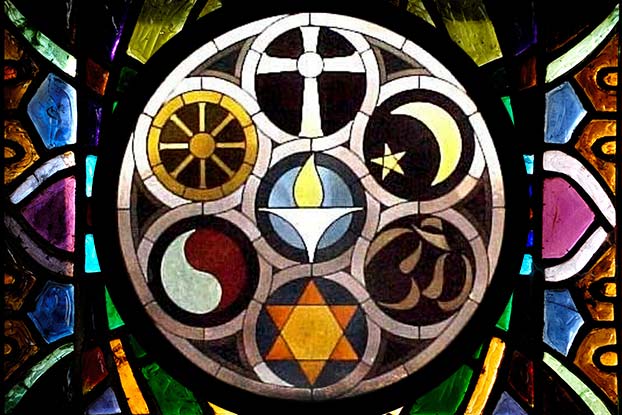Christianity and the Other Religions (Max Charlesworth)
|
Most Christians now realise the need for dialogue between the various Christian Churches - Roman, Catholic, Orthodox, Anglican, Protestant, etc. It's not just a matter of being nice to, or charitable towards other Christians, it is rather a matter of necessity in that we cannot know God's message in its fullness unless we talk to and understand our fellow-Christians. In the past, of course, the churches rejected each other: each church (whether it was Catholic or Orthodox or Protestant) claimed that it alone was right and that all the others were wrong: 'our' church alone offered the way of salvation and all the others were 'false prophets'. The saying, 'Outside the Church there is no salvation'.
Quest for unity However, the movement for Christian unity has taught us all to see other Christian traditions in a different way. Thus a Catholic or Anglican or a member of the Greek Orthodox Church may see his or her own Church as being more centrally and completely Christian than the others, but they can also recognise the good and worthwhile religious values that have been developed within various other traditions. The Holy Spirit is at work in the other Churches and they have each developed and emphasised different aspects of the Christian life: liturgy, spirituality, prayer, sacraments, theological reflection, Church organisation and government, social concern, etc. Christian unity does not involve one Church (whether Catholic or any other) taking over and absorbing all the others in an imperialistic way. Rather it consists in recognising the value of the various developments within the Christian family and in attempting to bring them together so that each can give to, and receive from, the others. In a sense we will not know the full meaning of God's revelation through Jesus Christ until we have pieced together the jigsaw which is made up of the various contributors from the Churches. The quest for this Christian unity is of course very difficult. It is all too easy to fall back into the old negative and exclusive attitude - we are right and you are wrong - and at the other extreme it is all too easy to pretend that there are not real differences between the Churches and to adopt an attitude that 'they are all as good, and as bad, as each other'. We have to tread a difficult middle way between exclusivism and relativism. Worlds apart The ecumenical approach is now accepted in almost all the mainline Christian Churches. But, curiously, while this positive and constructive attitude has been adopted within Christianity it seems to have very little effect on the relations between Christianity and the other great religions of the world - Judaism, Hinduism. Buddhism, Islam, Sikkhism, Confucianism, Taoism, Shintoism, etc. By and large many Christians still view non-Christian religions in the same negative and exclusive way that Catholics and Orthodox and Protestants saw each other before the beginning of the ecumenical movement. No doubt, we Christians are much more tolerant of the other great religions than we were in the past, but many of us certainly don't acknowledge the need for dialogue between Christianity and the other religious traditions. There have been, it is true, some tentative ventures in this wider ecumenism: for example, Dom Bede Griffiths, an English Benedictine monk, has devoted his life to promoting dialogue between Christians and Hindus, and there have been similar moves between Christians and Jews, Christians and Jews, Christians and Muslims etc. In our own country there have been some interesting and worthwhile attempts to relate Christianity to the various forms of Australian Aboriginal religion. However, these various attempts at inter-religious dialogue have been pretty modest and very restricted in their scope and influence by them and little attention is given to what I have called the wider ecumenism by theological colleges and seminaries. This is a great pity, so it seems to me, because in many ways Australian Christians are in a unique situation to promote inter-religious understanding. First, we live in a country that has the oldest form of religion known to man, Aboriginal religion, and we have a marvellous opportunity to study and learn from the very rich and complex Aboriginal spiritual tradition. (In the past Aboriginal religious beliefs and practises were seen as so much superstitious nonsense and mumbo jumbo and the idea of taking them seriously and even of learning from them would have seemed ludicrous.) Second, we are in a region of the world, South-East Asia, where all the great world religions are represented in neighbouring countries - India, Pakistan, Indonesia, Malaysia, China, Japan. Third, in multicultural Australia all these religions are represented. At the present they are minority groups, but in the future Hinduism and Buddhism and Islam and Sikkhism will become more and more important in Australian life. For all these reasons Australia is in a marvellous position to become a great religious cross-roads or forum where people from all the great religious traditions could meet and learn from each other. But to do this Christians in particular have to be convinced that they have something to learn from the other religious traditions. If they think that Christianity has everything, and that what is worthwhile in Hinduism or Buddhism or Islam is just a pale reflection of what we have already in Christianity, then of course there is no real reason for dialogue with them. No doubt we should be tolerant of them and nice to them, but we are really not going to learn anything that we didn't already know from them. |
patheos is a website devoted to hosting the conversation on faithFor your GlossaryCatholic
Orthodox Protestant Anglican Prophet salvation Greek Orthodox revelation exclusivism relativism ecumenism theological seminaries transcendent dialogue superstition idolatry |
What does God mean by it?
|
What is your POSITION?
1 - 2 - 3 - 4 - 5 The Catholic Church and the Other World Religions
As far as we can judge from the Catholic Church's official statements on this topic - especially, for example, from the Second Vatican Council's Declaration on Non-Christian Religions - the official Church position would be to place itself in Position 2 as describes in these pages.
The Church acknowledges the religious insights of religions other than Christianity: 'From ancient times down to the present, there has existed among diverse peoples a certain perception of that hidden power which hovers over the course of things and over the events of human life; at times, indeed, recognition can be found of a supreme Divinity and of a Supreme Father too. Such a perception and such recognition instill the lives of these peoples with a profound religious sense...' 'The Catholic Church rejects nothing which is true and holy in these religions. She looks with sincere respect upon those ways of conduct and of life, those rules and teachings which, though differing in many particulars from what she holds and sets forth, nevertheless often reflect a ray of that Truth which enlightens all men' (article 2) The document goes on from this to point out that Christians have a further perspective: 'Indeed, she [The Church] proclaims and must ever proclaim Christ, "the way, the truth, and the life" (John 14:6), in whom men find the fullness of religious life, and in whom God has reconciled all things to himself (cf, 2 Cor. 5:18-19)' (article 2). The Church rejects the differences of the past and urges reconciliation. For example, with regard to Moslems, the document says: 'Although in the course of the centuries many quarrels and hostilities have arisen between Christians and Moslems, this most sacred Synod urges all to forget the past and to strive sincerely for mutual understanding. On behalf of all mankind, let them make common cause of safeguarding and fostering social justice, moral values, peace, and freedom' (article 3). And the Council fathers spoke out strongly against anti-Semitism: 'Mindful of her common patrimony with the Jews, and motivated by the gospel's spiritual love and by no political considerations, she deplores the hatred, persecutions, and displays of anti-Semitism directed against the Jews at any time and from any source' (article 4). Any discrimination, even - or perhaps especially - on religious grounds, is deplored by the Council: 'The Church rejects, as foreign to the mind of Christ, any discrimination against men or harassment of them because of their race, colour, condition of life, or religion' (article 5). |
How should Christians see the relationship between Christianity and other religions - world religions like Hinduism and Buddhism and Judaism and Islam, and local and regional religions like those of the Australian Aborigines and the peoples of Papua New Guinea and Africa? What is the meaning of the fact that there are so many different forms of religious belief? What does God mean by it? Is it just an unfortunate accident, or is there some deeper purpose to it? We can set out the various possibilities as follows:
POSITION 1 Christianity is the sole true religion and all other religions are false: they are forms of superstition rather than authentic religion. Christ alone is 'the way, the truth and the life' and there cannot be other religious ways. Non-Christians must therefore be converted and offered the opportunity of becoming Christians, and the eventual hope of Christians must be that all other religions will be absorbed in some way into Christianity. The present situation of religious diversity and division has become about through sin and ignorance and when that is remedied true religious unity will come about through Christianity. POSITION 2 While Christianity is the sole true religion, other religions do have some value and we cannot simply reject them as being false and forms of superstition and idolatry. By following the religious way provided by their own traditions, people can be saved (they can be deemed to be 'implicit Christians' or 'Christians by desire') though what is valuable in those traditions can be found in a much fuller and richer way in Christianity. Christianity is the religion par excellence and all other religions can be rated by reference to Christianity. POSITION 3 Christianity has been given a central place by God among the religions of the world and it is in Jesus Christ that God has revealed himself most fully to us. But God has also revealed aspects of himself and his plans in other religions, and authentic religious values have been developed in those religions. Christians therefore need to engage in dialogue with Hindus and Buddhists. Jews and Australian Aborigines in order that Christianity may be enriched and complemented by what they have to offer. The fullness of God's truth will only be known and appreciated when all the 'revelations' to be found in the religions are put together. From this point of view, the diversity and variety of religions is not an unfortunate accident, but rather a way in which God reveals himself more completely POSITION 4 Christianity and all the other religions are simply particular manifestations or expressions of certain universal truths. Reduced to their essentials, they all say much the same things - that over and above the realm of physical existence there is a transcendent reality upon which we depend, and that we must acknowledge our dependence upon this transcendent reality. Put in another way, various religions including Christianity are different roads to the same destination. POSITION 5 Christianity is a form of religion which has been developed within Western European culture and it is limited by the constraints of that culture. It is a valid way of coming to God for people from Western culture, but it cannot claim to be the way or even the best way for everyone universally. These then are some of the views that have been put forward about the relationship between Christianity and other religions. How shall we choose between them? Here I can only indicate my own views, as a Christian belonging to the Roman Catholic Church. Max Charlesworth is Professor of Philosophy at Deakin University. He is the author of many books on religion including Religion in Aboriginal Australia (University of Queensland Press, 1984) and a book on comparative religion for children called Religious Worlds (Hill of Content, Melbourne, 1985). |




